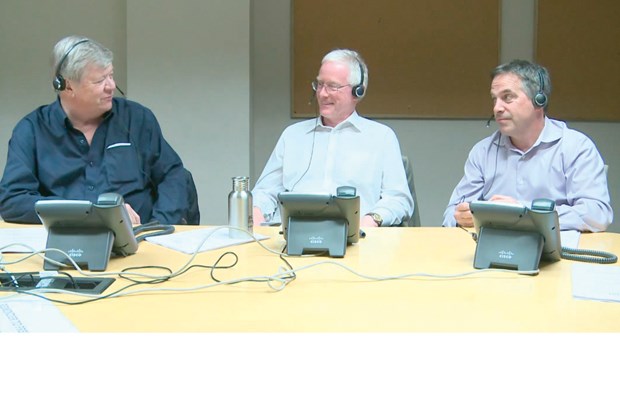If you had an unfamiliar voice in your ear Monday night telling you to vote yes in the upcoming TransLink funding referendum, there’s no need to see a shrink. It was probably one of North Vancouver’s two mayors.
City Mayor Darrell Mussatto and district Mayor Richard Walton spent the evening on a “telephone town hall,” stumping for a yes vote in the coming plebiscite. Joined by former CKNW host Bill Good, the mayors called up thousands of households and invited residents to listen and ask questions.
Lower Mainland voters will be asked if they approve of a .5-per cent sales tax increase to fund the improvements in the Mayors’ Council vision.
For the North Shore, that would mean a new SeaBus for more frequent trips, 30 per cent more bus service and rapid B-line buses connecting Phibbs Exchange to Dundarave, Capilano University to Metrotown and a third from Lynn Valley to downtown Vancouver.
That would put 50 per cent of North Shore residents and 70 per cent of North Shore jobs within walking distance of a B-line rapid bus route, Walton said.
Those and other projects will be needed as a million more residents are expected to live in the Lower Mainland in the next 30 years, 65,000 of them on the North Shore, along with 45,000 new jobs, Walton said.
“Do we do nothing and watch as traffic congestion gets worse? To me, that is a very, very big risk and the wrong direction for the North Shore and indeed, for the whole region,” he said.
The most oft-repeated concerns by skeptics and no-voters Monday night were familiar ones: TransLink’s credibility, assurances the money would be well spent and whether the North Shore would receive a fair share of the benefits compared to the rest of the region.
Mussatto stressed that funds collected would be heavily audited and under the supervision of business leader Jimmy Pattison who has volunteered to oversee the project free of charge.
“I want to be clear. The money is not collected by TransLink. It’s collected by the province and can only go to the projects in the mayors’ 10-year capital plan,” he said. “This means every penny goes into better buses, new rapid transit, road and bridge upgrades and safer walking and cycling.”
Still for some, that was cold comfort.
“You’re telling me all this money is going to get turned over to Christy Clark? Cripes,” said a caller named Ron.
Caller Margaret wanted to know what other options were on the table if the “Hail Mary pass” of a referendum doesn’t work. The answer, Walton said, wouldn’t be popular.
“There are certainly other options. I think the premier herself indicated property tax is an option,” Walton responded, but he added, the mayors have unanimously agreed not to raise property taxes any higher to fund TransLink.
On the question of why North Shore residents should vote yes, when subway and light rail projects in Vancouver and Surrey threaten to swallow up much of the new funding, the mayors said cheaper, less capital intensive projects like growing the bus fleet will likely be the first to come online.
“It’s our fair share if not more compared to what other areas are getting,” Mussatto said.
Other callers questioned why the money couldn’t be collected by raising fares and going after fare evaders.
“Apparently they’re losing millions of dollars to people riding for free. That’s why I’m voting no. If you’re going to talk about funding, the people who use it should be paying,” said a caller named Earl.
That was one Good opted to field himself.
“I asked the same question for about 20 years when I was on the radio. I was always told by the people who were in charge it had been determined it would cost more to set up a turn-style system, which I happened to have believed in for a long time. But it would actually cost more to capture the revenue than was being lost,” he said.
Mussatto added it was the province that forced the ill-fated fare gate system on TransLink.
Mayors from around the Lower Mainland have been taking turns doing telephone town halls to address their constituents’ concerns.
North Vancouver mayors had the unlucky task of working the phones on the day polling firm Insights West released statistics showing 55 per cent of more than 1,600 Lower Mainland residents polled planned to vote no, compared to 33 per cent planning to vote yes.
Ballots start arriving in the mail on March 16 and must be returned to Elections B.C. by May 29.



